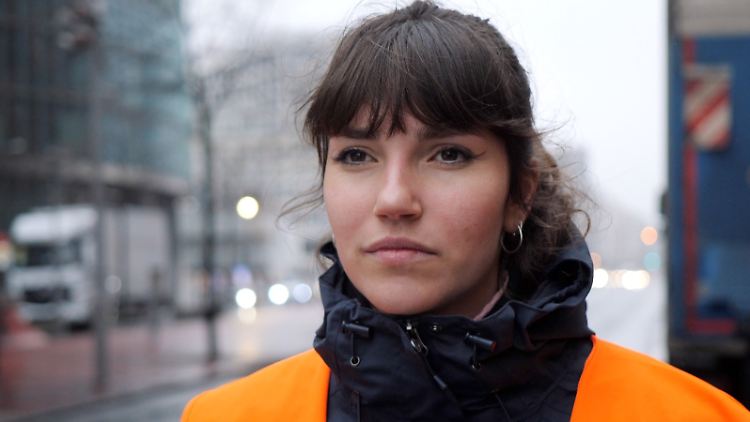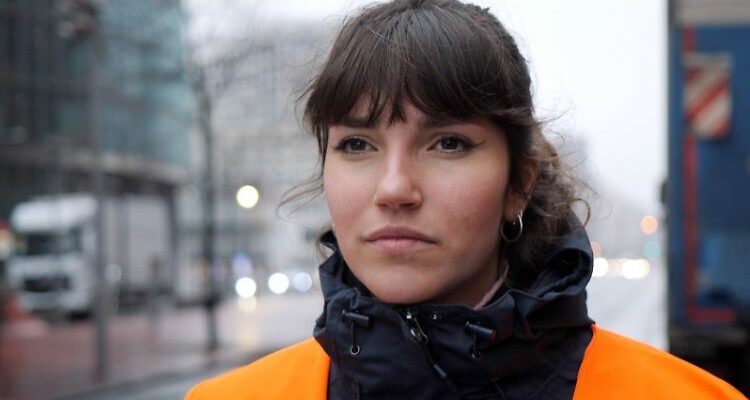After the street, the last generation also wants to conquer the European Parliament for themselves. Spokeswoman Carla Hinrichs explains why the climate activists are running in the European elections, how they want to shake up the plenary hall and what it means for them to have “the protest in their hearts”.
ntv.de: At the end of January you gave up your blockades by sticking body parts on the streets. This protest made you partly unpopular among the population. The hostilities lead to that you lack followers. Is this really the right time to run for membership in the European Parliament?
Carla Hinrichs: Running for the European Parliament is a logical step. We want to carry the resistance into all areas of society. Parliament is part of this. If we look at the work our parliaments are doing, they are letting us continue to steer us towards a catastrophe without making any lasting changes. We say: There is no longer a need for individual small laws and reforms, but there needs to be people who bring in the resistance, who shake things up, who drag the elephant sitting in the room in front of the cameras. Of course we will continue to protest on the streets.

The last generation wants to “shake up” the system, emphasizes spokeswoman Carla Hinrichs.
(Photo: John Mio Mehnert)
You say you want to shake up the European Parliament. Does this also mean disruptive actions in the plenary hall?
If you know us, you know that we are creative in our protests. It would be possible for us to hear a few funny jokes in Parliament or for someone to bring pudding to Parliament. What you can count on is that we will bring the protest to parliament honestly, authentically and peacefully and make it clear that things cannot continue like this.
Your critics might say that pudding actions in Parliament are neither particularly peaceful nor useful. What do you say to them?
I wouldn’t call controversy a bad thing. The most dramatic thing that can happen right now is that we carry on in this way, that we all keep our feet still and say: The government has this under control, we can manage it. But people who stand up, wake up, are loud and create a debate about whether we as a society want to go over the cliff or not are not a bad thing, they are vital.
You said in January that you wanted to “increasingly directly confront those responsible for climate destruction in the future” and to do this by “calling out politicians and other decision-makers publicly and in front of cameras.” If you become a member of parliament after the election, won’t you yourself become one of the politicians you scolded?
We carry in our hearts the resistance, the protest and especially the will to survive. We don’t want to take part in this system and we want to work together to ensure that we don’t go over the cliff. We want to shake it up and in doing so we will also challenge it. What we want is a system that goes beyond itself, that involves more people, that brings together social councils so that the whole of society can talk about the question: How do we get out of this catastrophic situation?
In addition to the Europe-wide introduction of randomly assigned social councils, they are also calling for support for climate movements and the fastest possible exit from fossil fuels. How do you want to convince many people with these specific demands?
The people we want to reach no longer feel like putting a cross on the ballot paper where they think the least evil is. They want to vote for what can still save us – that is peaceful protest in times of crisis. That’s exactly what we want to offer people because the parties are failing, the party system is failing. In the 2021 federal election, there was no party that I could have voted for that represented my interests as a young person in this country who does not want us to head further into this catastrophe. We want to give people the opportunity to choose what they believe in. History has shown that when there is peaceful, mass protest, we can bring about change in a very short time.
From your point of view, the party system is failing. Now you can found a party yourself and you could benefit from state money. The Greens are now also established, but emerged from a resistance movement. Aren’t you afraid of being institutionalized?
We swore solemnly that we didn’t like Brussels sparkling wine. We are young people, we are a little crazy, but with love and confidence in our hearts. We reach for the stars. We have nothing to lose. The only thing left for us to do is say: We’re not fucking taking part in this, even if you all want to continue like this.
You say younger people are your target group. Are there plans to expand the election program to also represent the interests of pensioners, for example?
We address all people in this country who want to survive. Those who are tired of carrying on as before, who are tired of the rich getting richer and enriching themselves from our livelihoods and who are tired of governments fueling this. It doesn’t matter whether people are young or old, whether they are craftsmen or work in a large company. We are aimed at those who are tired of all this shit. The criminal biologist Mark Benecke said in a lecture that next summer we will have the hellish summer of the millennium. You have to let it melt in your mouth.
There are already several parties that want to convince the European elections with an ecological program. In addition to the Greens, the Left’s top candidate, activist Carola Rackete, also stands for a more radical climate policy. How do you want to stand out from this competition?
We don’t see this as competition. We are daring to take a new path, we are not running as a normal party, but as a resistance movement. That’s why we don’t see ourselves as competition to other movements that also do important work.
You have chosen Lina Johnson and Theo Schnarr as your top candidates. Why?
Because they both carry this resistance deep in their hearts and we believe that, as spokespeople for our movement, they are capable of being the voice of the movement in parliament. We all carry the protest in our hearts when we choose to face the consequences. With road blockades, this often means exposing yourself to physical violence and state repression. That’s not nice, you have to be convinced of it.
Office work in Brussels is fundamentally different from actions on the street. What do you expect from Ms Johnson or Mr Schnarr if they win a seat in Parliament?
I understand that there is a desire to put us in a box and now slap a category on it: climate activist, politician, member of the EU Parliament. Everyone wants a category. They don’t exist. We choose a new path. You have to be creative. We’re already making plans. This can be anything from blocking roads to planting potatoes in front of the Chancellery or pouring oil on yourself while playing Chancellor Olaf Scholz looking for oil. We can count on a range of protests that appeal to every emotion.
So, in addition to pudding campaigns, you can also expect such scenes in the European Parliament if you move there?
I wouldn’t rule that out.
Lea Verstl spoke to Carla Hinrichs
